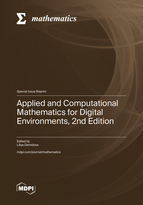Applied and Computational Mathematics for Digital Environments, 2nd Edition
A special issue of Mathematics (ISSN 2227-7390). This special issue belongs to the section "Computational and Applied Mathematics".
Deadline for manuscript submissions: closed (5 January 2024) | Viewed by 9926
Special Issue Editor
Interests: population-based optimization algorithms; applied mathematics; machine learning; deep learning; data mining; fuzzy set theory; classification; pattern recognition; algorithms
Special Issues, Collections and Topics in MDPI journals
Special Issue Information
Dear Colleagues,
It is necessary to consider the possibility of applying the principles of computational mathematics and informatics to optimize the study and modeling of various real-world phenomena with the use of intelligent software and hardware platforms based on math apparatus and appropriate modules. Practical implementations of mathematical, bio-inspired algorithms and models for developed software applications in the digital environments of corporate information systems of the industrial-enterprise-paradigm-based “Industry 4.0” will be proposed in this Special Issue of Mathematics entitled “Applied and Computational Mathematics for Digital Environments”.
This Special Issue will consider scientific research, applied engineering tasks, and problems in the following areas:
- Building mathematical, structural, and information models of intelligent computer systems for monitoring and managing the parameters of digital environments;
- Software and mathematical technologies in the implementation of the intelligent monitoring and computer control of digital environments’ parameters;
- Application of mathematical models, Internet of Things technologies, machine learning, and artificial intelligence for big data analysis of digital environments;
- Mathematical models and algorithms for identifying stable patterns between the parameters of digital environments and their complex and separate influence;
- Mathematical modeling, machine learning, and their implementation within the concept of “smart” digital environments.
Prof. Dr. Liliya Demidova
Guest Editor
Manuscript Submission Information
Manuscripts should be submitted online at www.mdpi.com by registering and logging in to this website. Once you are registered, click here to go to the submission form. Manuscripts can be submitted until the deadline. All submissions that pass pre-check are peer-reviewed. Accepted papers will be published continuously in the journal (as soon as accepted) and will be listed together on the special issue website. Research articles, review articles as well as short communications are invited. For planned papers, a title and short abstract (about 100 words) can be sent to the Editorial Office for announcement on this website.
Submitted manuscripts should not have been published previously, nor be under consideration for publication elsewhere (except conference proceedings papers). All manuscripts are thoroughly refereed through a single-blind peer-review process. A guide for authors and other relevant information for submission of manuscripts is available on the Instructions for Authors page. Mathematics is an international peer-reviewed open access semimonthly journal published by MDPI.
Please visit the Instructions for Authors page before submitting a manuscript. The Article Processing Charge (APC) for publication in this open access journal is 2600 CHF (Swiss Francs). Submitted papers should be well formatted and use good English. Authors may use MDPI's English editing service prior to publication or during author revisions.
Keywords
- artificial intelligence
- big data
- machine learning
- digital environments
Benefits of Publishing in a Special Issue
- Ease of navigation: Grouping papers by topic helps scholars navigate broad scope journals more efficiently.
- Greater discoverability: Special Issues support the reach and impact of scientific research. Articles in Special Issues are more discoverable and cited more frequently.
- Expansion of research network: Special Issues facilitate connections among authors, fostering scientific collaborations.
- External promotion: Articles in Special Issues are often promoted through the journal's social media, increasing their visibility.
- e-Book format: Special Issues with more than 10 articles can be published as dedicated e-books, ensuring wide and rapid dissemination.
Further information on MDPI's Special Issue polices can be found here.






